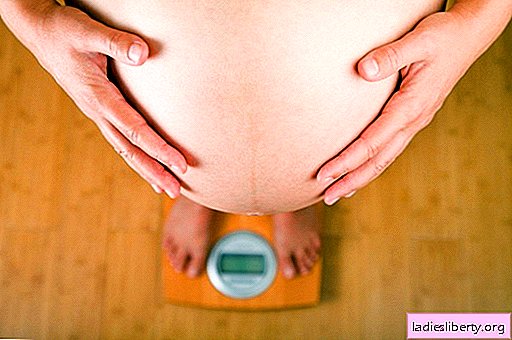
Many girls even before pregnancy are panicky in the process of gaining excess weight. These fears have some basis, since many young mothers have problems with this. However, you should not panic in advance, especially because of these fears to postpone pregnancy. An appropriate diet and lifestyle will help maintain optimal weight. To add weight “on schedule”, you should adhere to the principles of proper nutrition.
How is weight gain during pregnancy
In some cases, a woman may lose weight during the first trimester of pregnancy. This is due to nausea and vomiting, a change in appetite and taste preferences. The fruit still has a small size.
Then begins the weight gain. Moreover, in the second half of pregnancy, weight increases more active than in the first. Indeed, in the early stages of pregnancy, the woman is still working, leading an active lifestyle, the body is in the process of restructuring. But in the second period, the uterus grows, the fetus becomes larger, the volume of amniotic fluid also increases, blood flow in the uterus increases. The fat layer is becoming larger to ensure future breastfeeding.
What factors affect weight gain during pregnancy?
A woman during pregnancy is gaining more or less extra kilograms, depending on some factors. Of great importance are:
- Body weight before pregnancy (the larger it is, the more possible increase may be).
- Age. Older women have more risks of gaining excess body weight, since the body undergoes hormonal changes to a greater extent.
- The number of lost kilograms in the first trimester with toxicosis. Do not enjoy big weight loss. The body can actively compensate for this deficiency in subsequent months, and as a result, there may be an increase above the norm.
- Increased appetite. Future mothers explain that the body requires food "for two." This is a common misconception. The amount of food and weight should be controlled through exercise and proper nutrition so that the result remains predictable.
How is weight gain distributed during pregnancy?
The weight of the fetus at the end of pregnancy is 3-4 kilograms. A significant increase occurs at the end of the third trimester. The uterus and fetal fluid weigh about 1 kg, the placenta accounts for only half a kilogram. The volume of blood significantly increases at this time, this is approximately 1.5 kg. The total volume of fluid increases by 1.5-2 kg, the mammary glands increase by about half a kilogram. Extra body fat takes about 3-4 kilograms, so the body takes care of the safety of the child.
How much will you gain in total?
Each case is individual and it is quite difficult to predict exactly what your personal weight gain will be. In order not to bother you with all kinds of theoretical calculations, let's listen to what the doctors say. Most of them agree that women of average build on average add 12-13 kg during pregnancy. If twins are expected, then the increase will be 16-21 kg. For slender girls, the increase will be a couple of kilos less.
You will gain this weight:
In the first two months - the weight gain will be practically zero. According to the results of the first trimester - 1-2 kg. Starting from the thirtieth week, you will add about 300-400 g per week.
You can make a more accurate calculation of normal weight gain in the last three months of pregnancy using a simple formula. Weekly, you should add 22 grams of weight for every 10 cm of your height. Those. if your height is 150 cm - you should add 330 grams. If 160 cm - 352 grams. If 170 cm - 374 grams. And at 18 cm. Height - 400 grams of weight every week.
This is how the norm looks.
What is the danger of excessive weight gain during pregnancy
The weight problem is important for the gynecologist, since possible edema can complicate pregnancy and a woman's health can be in danger. Swelling is the fluid that goes into the tissue. Hidden edema is not visible even on the legs, but over time they can be seen in the feet and ankles. Next come the hands and face.
Most often, edema appears in the last months of pregnancy. In small manifestations, they are considered quite safe. If the heart or kidneys worked with disorders before pregnancy, then edema can signal an exacerbation of the disease. The most severe edema appears under the influence of gestosis. Doctors make this diagnosis when there are several signs: edema, excessive protein in the urine and increased pressure. Vascular disorders require immediate medical attention and treatment. That is why the doctor carefully controls the weight to exclude gestosis.
In addition to edema, the formation of a large amount of adipose tissue leads to weight gain. The negative effect in this case is expressed by an increased load on the spine. Severe back pain is aggravated as a result of osteochondrosis and a large load on the intervertebral discs.
Pregnant women who do not control their weight have large risk factors for the formation of varicose veins, which can lead to additional edema in the legs. If coagulation rates are high, the risk of thrombosis is highest.
In addition, as a result of too rapid weight gain, the load on the cardiovascular system and digestive tract increases. High cholesterol negatively affects the state of blood vessels, intensive liver function may have negative consequences in the future. And the fetus itself is very large, which complicates the normal course of labor. With a narrow pelvis, a large fetus is much more difficult, which can lead to the need for a cesarean section.
Nutrition and weight during pregnancy: how not to gain too much?
So that the weight during pregnancy does not exceed the necessary norms, you need to monitor the diet and engage in active physical education. Exercise is prohibited only with the threat of pregnancy, in its normal course, fitness or swimming are quite acceptable things. It is advisable to move as much as possible, make daily walks, morning exercises and exercise, then you can maintain normal weight throughout the entire period.
The nature of nutrition becomes more important than the amount of food. The child himself takes the necessary elements from the mother’s blood, so you should not exclude from the diet the usual foods - potatoes, pasta, etc. You can simply limit their number. And cottage cheese, meat and vegetables should be in large quantities.
If you are overweight, you should not go on a diet before pregnancy, as weight loss affects the activity of many organs, which can negatively affect the development of the child. The main thing to remember is that there should be a middle ground in everything. Fast weight loss is just as bad as fast weight gain.
You can find detailed information on proper nutrition during pregnancy on our portal.
Comments











